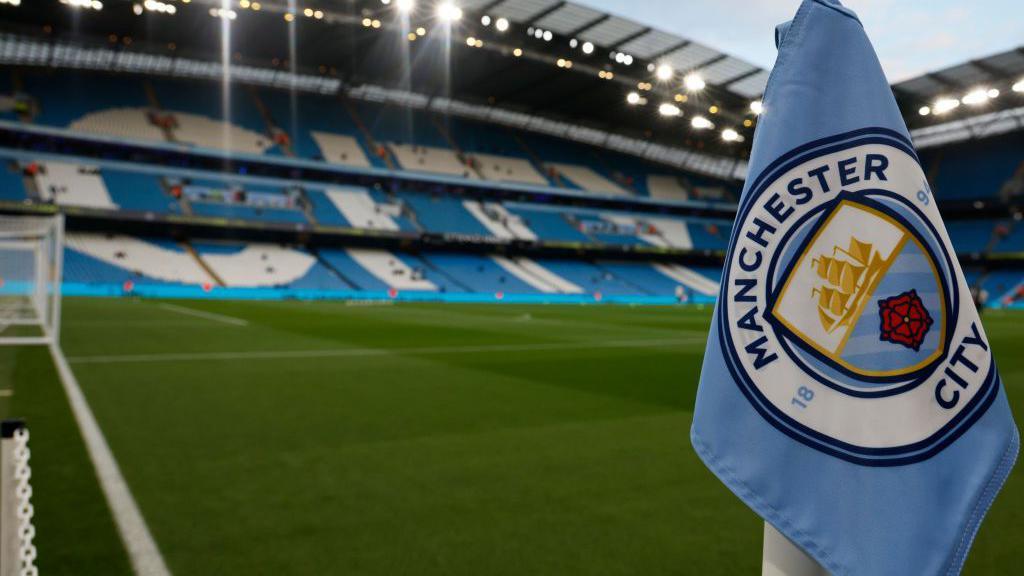Man City v Premier League legal case verdict - what it all means

Manchester City had taken legal action against the Premier League's APT rules
- Published
The verdict has been announced in Manchester City's legal case against the Premier League over the league's rules on commercial deals involving clubs' owners.
City, who are owned by the Abu Dhabi-backed City Football Group, had some complaints upheld, with two aspects of the associated party transaction (APT) rules deemed unlawful by a tribunal.
But the Premier League says the tribunal rejected the majority of Manchester City's challenges and "endorsed the overall objectives, framework and decision-making of the APT system".
APTs are aimed at the value of sponsorship deals with companies linked to clubs' owners.
This case is not directly related to the Premier League disciplinary commission which will hear 115 charges against City for allegedly breaching its financial regulations, some of which date back to 2009.
The tribunal - in a 175-page document - ruled that shareholder loans should not be excluded from the scope of APT rules and that some amendments made in February by the Premier League should not be retained.
In this arbitration process, Chelsea, Newcastle and Everton all acted as witnesses for City.
'Both sides can claim victory' - Man City legal case explained
- Published7 October 2024
Witnesses for the Premier League included Manchester United, Liverpool, Arsenal, Tottenham, Brighton and West Ham.
Brentford, Bournemouth, Fulham and Wolves wrote letters in support of the rules.
BBC Sport has asked all the clubs mentioned for comment and none have yet responded.
Simon Leaf, partner and head of sport at law firm Mishcon de Reya, told BBC Sport: "Whilst the decision will be embarrassing for the Premier League, because in a couple of narrow areas their rules have been found to be unlawful, generally speaking the decision confirms that the vast majority of the APT rules are indeed lawful.
Speaking at the LawInSport Global Summit, Leaf added: "Therefore whilst we can expect to see some changes to the rules going forwards, on the whole this isn’t a resounding victory for Manchester City by any stretch of the imagination."
The Premier League has called a meeting for next week to discuss the implications of the judgement.
Man City's hearing for 115 charges begins
- Published16 September 2024
How did we get here?
APTs are commercial deals involving clubs and companies to which they have close ties. Restrictions on fair market values (FMVs) were introduced in December 2021, shortly after a Saudi-led takeover of Newcastle.
The Premier League has the right to assess the value of such deals to ensure they have not been inflated, which could give clubs more to spend under current financial rules.
The rules were changed following a vote in February that was not unanimous. Twelve clubs voted to change the rules, with two abstaining and six voting against the changes.
Those rule changes involved amendments to the definition FMV, and shifting the burden of proof to a club to show a transaction is at fair market value.
The BBC reported in June that City were due to face the Premier League in a legal battle.
The Premier League and Manchester City both said they welcomed the tribunal findings announced on Monday, with each side focusing on the elements in their favour.
What the Premier League says...
The Premier League's statement said that City "brought a wholesale challenge" to the APT rules and were "unsuccessful in the majority" of the challenge.
It added the tribunal deemed the APT rules to be necessary and that if prices above fair market value were paid then "competition will be distorted as the club would be benefiting from a subsidy".
The league also said the tribunal had "rejected Manchester City's argument that the object of the APT rules was to discriminate against clubs with ownership from the Gulf region".
Its statement also said that, except in the two respects where City won, the tribunal found that City's arguments were "unfounded, including on any alleged inconsistency in approach as between certain types of clubs".
What Manchester City say...
City's statement focused on the two areas where they won, as the club claimed the "Premier League was found to have abused its dominant position".
It said the club had "succeeded with its claim" and that "the APT rules were found to be unlawful".
City added that the tribunal found "both the original APT rules and the... amended... rules violate UK competition law... and the requirements of procedural fairness".
The Premier League champions said the rules were found to be "discriminatory... because they deliberately excluded shareholder loans".
And the club added "there was an unreasonable delay in the Premier League's fair market value assessment of two of the club's sponsorship transactions".
What's next?
The Premier League says it will look to change the two aspects that the tribunal ruled against the league on.
That means integrating the tribunal's assessment of shareholder loans and removing some of the February amendments.
It says it is "conducting a process that can allow the league and clubs to enact those specific changes quickly and effectively".
'Concerns that clubs could be hit with additional costs'
BBC News sports editor Dan Roan
Both sides are claiming victory, and in truth the judgement contains something for both City and the Premier League.
League sources are emphasising the fact that most of City's challenges to the APT rules failed, and that the wider system was endorsed by the panel.
They also seem confident that the rules will be swiftly amended by the clubs within two weeks in order to make them lawful.
But the panel's ruling that the exclusion from the rules of interest-free loans from owners to their clubs (shareholder loans) was unlawful, has led to concerns that clubs could now be hit with additional costs that they were not anticipating.
This could mean some are in danger of breaching PSR regulations. The suggestion is that such loans will now be subject to commercial market rates of interest.
That could have major ramifications for those clubs that owe tens (or even hundreds) of millions of pounds to their owners.
The Premier League seems relatively relaxed about that issue, along with speculation that City and other clubs could seek compensation for any losses suffered by the rules.
On shareholder loans, league officials believe a fair market value analysis of such borrowings would be placed on the cost of the loan (i.e. the interest rate), not the value of the loan itself, and that the impact on clubs, therefore, would be minimal.
They also feel that such loans will only come into the scope of APT once the rules are amended, and will not be applied retrospectively, so only future loans will be affected.
However, BBC Sport has learned that City’s lawyers believe that not subjecting previous shareholder loans to a Fair Market Value assessment (while continuing to apply it to previous sponsorship deals) would be unfair, and that they may seek an injunction to prevent the Premier League from doing so.
But there will be fears from some in the game that any weakening of APT rules designed to preserve fairness and competitive balance could lead to certain clubs being able to sign more lucrative commercial deals.
There is also the question over whether this could have an impact on the 100-plus charges the league has brought against City for alleged financial rule breaches. City deny wrongdoing, and a hearing into the case continues.
Whatever the consequences, what is clear is that this dispute has reinforced the sense of division among the clubs over the financial regulations they are subject to.
'The Premier League feels it is OK'
BBC Sport's chief football news reporter Simon Stone
From reading the tribunal's decision, the complexity of this case is highlighted in a couple of points.
The first is that for the hearing, there were 280 pages of statements and 150 pages of submissions. The second is the verdict itself, which runs to 177 pages.
On pages 161 and 162 of the verdict, eight separate areas in which City have failed in their claim are identified.
However, on page 163, it outlines that declaratory relief, injunctive relief and damages can be sought. This could be a financial problem for the Premier League depending on whether City pursue a claim - which they have indicated they will - and what the size of it is.
Of even greater issue are the comments on page 164, which point out a number of the Premier League's rules are unlawful as they don't include shareholder loans. It is this which forms the basis of City saying the Premier League has "violated UK competition law".
In order to change the rules, the Premier League will need 14 clubs to vote in favour. However, some of the clubs benefit from shareholder loans at preferential (or non-existent) rates. Getting the rule changes required may not be straightforward.
It is also the second time in just over a month that issues with wording within Premier League regulations have been highlighted after Leicester had their financial regulations breach charge thrown out.
That regarded an issue surrounding whether they were a top-flight club on the 30 June reporting date, in a season where they competed in the Premier League but were relegated (before 30 June).
The Premier League feels it is OK after this latest decision because of the number of allegations dismissed but it remains to be seen whether their calm reaction is justified.
The fierce manner in which City have responded to the verdict, allied to the knowledge they are currently fighting the substantive issue of 115 financial charges, which they deny but if found to have breached will be seismic, suggests they have spotted a weakness in the Premier League’s regulations and will look to exploit it as far as they can.
Related topics
- Published11 August 2023
